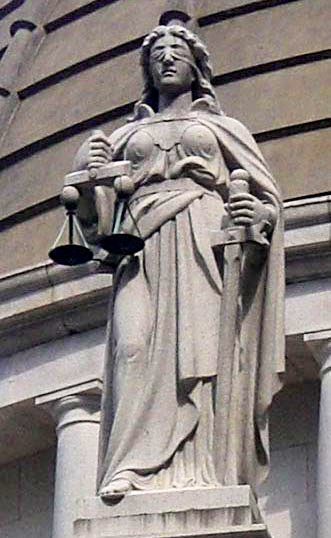
President Trump and Supreme Court Chief Justice Roberts exchanged strong words over the past few days on the subject of justice. Ross Douthat summarized the initial interaction at The New York Times:
After the president complained that an “Obama judge” from the Ninth Circuit had ruled against his administration’s asylum policy, the chief justice issued a highly unusual rebuke, declaring that “we do not have Obama judges or Trump judges, Bush judges or Clinton judges,” and an “independent judiciary is something we should all be thankful for.” This predictably inspired a tweeted rejoinder from the president: “Sorry Chief Justice John Roberts, but you do indeed have ‘Obama judges,’ ” Trump began, before dilating on his grievances against the Ninth Circuit’s alleged overreach.
Senate Minority Leader Chuck Schumer also weighed in on the debate, siding with Roberts, whom Schumer labeled a Republican who rules at times in a partisan manner. By Schumer’s own account, his affirmation of Roberts was unusual. Here’s Douthat’s citation of Schumer: “I don’t agree very often with Chief Justice Roberts, especially his partisan decisions which seem highly political on Citizens United, Janus, and Shelby. But I am thankful today that he — almost alone among Republicans — stood up to President Trump and for an independent judiciary.”
Roberts is certainly right in terms of affirming the ideals of our democratic system with checks and balances aimed at preserving justice from political encroachments from the right or left. However, both Trump and Schumer illustrated how partisan they perceive the Supreme Court to be. Moreover, Supreme Court appointments over the past several administrations reveal how partisan the process of the selections and review of nominations and final determinations have become. Both sides work extremely hard to put in place appointments that favor what they deem to be favorable to their brand of politics, or at least, interpretation of the law. The recent Kavanaugh selection is only the latest example of this dynamic.
Citing various historical examples, including Andrew Jackson, Abraham Lincoln and FDR, Douthat points out that the Supreme Court’s sovereignty in relation to the U.S. Presidency depends on the President’s willingness to submit to its determinations. What is lacking presently in Douthat’s mind is a robust third arm in federal government–Congress. In Douthat’s estimation, we find ourselves in a tug-of-war between two imperial powers. Only a strong Congress can restore equilibrium. In my estimation, that will require far less partisan wrangling than we witness presently.
Douthat exhorts his readers to consider carefully what may be unfolding in our nation–the deterioration of our republic. It is not simply a matter of Trump vs. Roberts with Schumer weighing in. These accounts are only telling examples of this possible erosion of our government and due process in pursuing justice. Our republic seems to have forgotten that you cannot court true justice with partisan power and prestige. True justice only responds to reason, what is decent, and what is right.
The Romans esteemed Justitia, the goddess who personified the qualities most often depicted by Lady Justice in modern times. These transcendent qualities certainly mirror Christian Scripture’s esteem for God. God rules justly. Divine justice is fair and impartial, but not indifferent. God weighs carefully every aspect of a case. When the divine verdict is declared, God backs it up with all rule and authority. The Apostle Paul gets at these themes in the following address:
He will render to each one according to his works: to those who by patience in well-doing seek for glory and honor and immortality, he will give eternal life; but for those who are self-seeking and do not obey the truth, but obey unrighteousness, there will be wrath and fury. There will be tribulation and distress for every human being who does evil, the Jew first and also the Greek, but glory and honor and peace for everyone who does good, the Jew first and also the Greek. For God shows no partiality. (Romans 2:6-11; ESV)
Elsewhere in Scripture we also find God presented as just and impartial: “For the Lord your God is God of gods and Lord of lords, the great, the mighty, and the awesome God, who is not partial and takes no bribe.” (Deuteronomy 10:17; ESV) Divine justice weighs the evidence carefully, cuts deep, and gets to the heart of the issue. God’s justice revealed in Jesus accounts for all matters of justice, from the least weighty to the matters of greatest gravitational pull. As Jesus declares, “Woe to you, scribes and Pharisees, hypocrites! For you tithe mint and dill and cumin, and have neglected the weightier matters of the law: justice and mercy and faithfulness. These you ought to have done, without neglecting the others. You blind guides, straining out a gnat and swallowing a camel!” (Matthew 23:23-24; ESV)
History is filled with examples of what is called justice going to the highest bidder or being swayed by partisan or public opinion. Even Jesus, by whom God will finally judge the nations (See Matthew 25) was judged wrongly–dying a wrongful death by crucifixion under the Roman governor Pilate. Indeed, given who Jesus was and is, it is fair to say that Jesus’ trial was the greatest travesty of justice in the history of the world. Pilate knew Jesus to be innocent, and yet he washed his hands of him and justice, too (Matthew 27:24).
The Bible does not turn a deaf ear to the cry for justice, or deny that we humans often fail to uphold justice in a court of law. Even so, apart from all the partisan and political posturing, it upholds the ideal that in the end justice will prevail. God will see to it.












